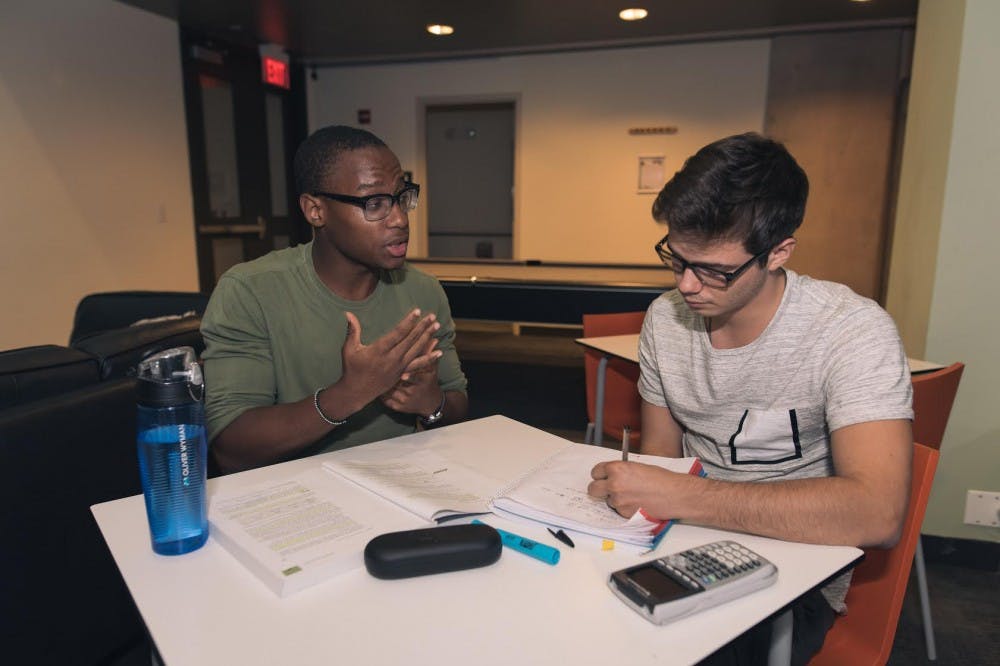It might now be quicker for you to find a tutor than to look up your question on Google.
Quickhelp is an on-demand tutoring service that connects college students looking for help with graduate students looking for an extra source of income — they charge, on average, $23 per hour. The application has been set up at many universities across the United States to provide students with quick, easy and cheap tutoring services. Recently, it was introduced at Penn.
Students who join Quickhelp register with their schools when they install the application. When they have questions, they send out a request for tutors, which is sent out to about 30 or 40 graduate students in the area. Then, the tutor and tutee can schedule a tutoring session in person, which is most highly encouraged, but also online or via Skype.
“We focus on in-person tutoring because that’s the way people learn the best,” Hikari Senju, 2015 Harvard graduate and Quickhelp CEO, said. “You learn the best when you’re face to face at a coffee shop, looking at the same problems, talking to each other and you’re understanding what the other is saying.”
Quickhelp is nicknamed the “Uber for Tutors.”
“The way Uber works is it serves as a medium for providing clients with drivers,” Ajani Motta, College freshman and Quickhelp Manager of Operations at Penn, said. “We do the same in that we pair undergraduate students with graduate students for academic help, interview help, resume help [and] assistance that graduate students have experience with and undergraduate students don’t.”
Quickhelp reached out to Motta in December about launching the program at Penn. Senju expressed his excitement about the initiative.
“I think Philadelphia is a great place to launch and we’re clearly seeing that based on the usage,” Senju said. “Sometimes a city is more spread out, people don’t communicate with each other as much or people aren’t living as close to each other, so very few other places or cities are as perfect for it as Philadelphia and this huge research institution, Penn.”
Since its launch on Jan. 30 at Penn, 500 students have signed up for the service and an average of three tutoring sessions have been held per day.
“Every request that gets sent out at Penn gets a response literally within minutes,” Senju said. “We’ve had a bunch of requests at Penn per day — at least a couple per day — and it’s very exciting.”
Alexandra Tiger, a College senior, is one of the Penn students who has already been able to take advantage of Quickhelp.
“I used Quickhelp once last week when I needed help with a statistics homework and I got multiple responses within minutes,” Tiger said. “I met with a graduate student named Divyansh and he was extremely helpful.”
Though Penn offers free tutoring services at the Tutoring Center, Senju said that Quickhelp offered advantages that the Tutoring Center could not.
“It takes weeks or days to schedule [sessions with the Tutoring Center], but our app lets you meet a tutor within hours,” Senju said. “There’s less bureaucracy, you don’t have to fill any forms out, you don’t have to wait a week — the program is built around the students, not built around the necessities of the school.”
Senju also noted that Quickhelp is distinct from other tutoring applications on the App Store.
“There are tons of apps out there that are tailored for high school students, but we’re one of the very few apps that focus on college students,” Senju said. “Because we focus on colleges, we get to do a lot of other cool things: We get to focus on in-person tutoring because college students live close to each other — the person who is helping you might be living in the next building.”
Quickhelp is planning further developments to supplement students’ learning at Penn as well as other universities. One of these developments will allow tutees to not only schedule sessions with tutors, but also discuss problems with other peers in the course.
“The way the app works now, once you download the app you register with the university and if you want academic help, you provide a course listing,” Motta said. “We’re working on a development in which if you click a course, it creates a message board that connects all the people who are taking a particular course so people [can] work with others who may be experiencing the same problems.”









